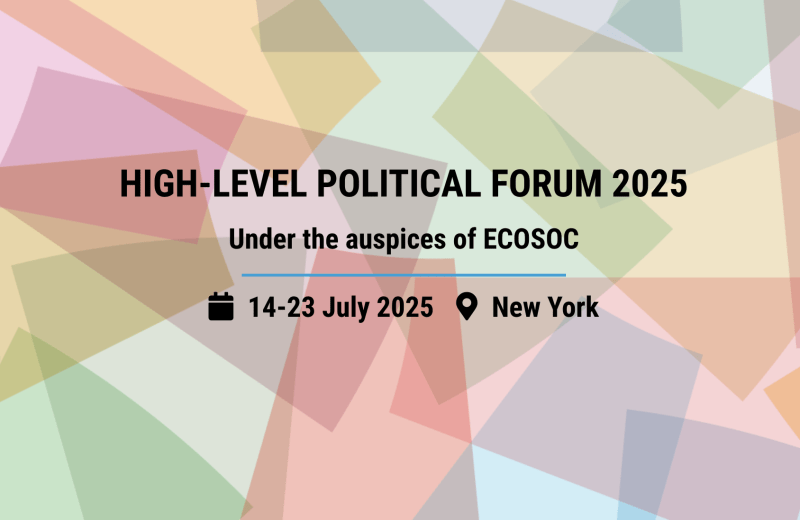
At the conclusion of the 2025 High-Level Political Forum (HLPF) held at the United Nations Headquarters in New York from 14-24 July 2025, the UN Member States adopted a Ministerial Declaration reaffirming their unwavering commitment to the 2030 Agenda for Sustainable Development. The Declaration, adopted amid escalating global inequalities, climate threats, and a staggering $4 trillion annual SDG financing gap, called for urgent, inclusive, and science-based solutions to accelerate SDG implementation. The forum placed particular emphasis on climate adaptation, universal health coverage, digital inclusion, gender equality, and decent work.
This year’s forum included the presentation of 35 Voluntary National Reviews (VNRs), which featured country-level progress and challenges on SDGs 3 (health), 5 (gender equality), 8 (decent work), 14 (life below water), and 17 (partnerships). Delegates highlighted national strategies for advancing inclusion, promoting innovation, and closing equity gaps. Education emerged as a critical issue, with over 250 million children still out of school and millions more not meeting basic learning standards, issues compounded by poverty, digital inequality, and conflict. A cross-cutting message of the forum was the need for context-specific, locally grounded solutions developed through participatory governance. It is in this space that the cooperative movement, recognised for its inclusive, democratic, and people-centred model, was spotlighted as a key partner.
The 2025 Ministerial Declaration explicitly acknowledges the role of cooperatives twice under SDG 8. Paragraph 75 states:
“We recognize the important role of the social and solidarity economy, including cooperatives and other community-based enterprises, in creating decent jobs, strengthening local economies and advancing sustainable development and the realization and localization of the Sustainable Development Goals.”
Paragraph 81 further emphasises support for cooperatives:
“We also commit to addressing the challenges faced by local business communities by supporting micro-, small, and medium-sized enterprises and cooperatives throughout the value chain, operating in both the formal and informal economies.”
This marks a significant reaffirmation of the commitment made at the 1995 First World Social Summit in Copenhagen, where cooperatives were recognised in the Copenhagen Declaration on Social Development as vehicles for poverty eradication, employment generation, and social integration under commitment 9 (h):
“Utilize and develop fully the potential and contribution of cooperatives for the attainment of social development goals, in particular the eradication of poverty, the generation of full and productive employment, and the enhancement of social integration.”
The recognition of cooperatives was also reinforced at the 2025 Fourth International Conference on Financing for Development in Seville in July, which emphasised investment in Micro, Small and Medium Enterprises (MSMEs), cooperatives, and the social and solidarity economy as drivers of inclusive and sustainable economic growth. Read the ICA’s article on this here: https://ica.coop/en/newsroom/news/cooperatives-recognised-financing-development-political-declaration.
Throughout the HLPF, cooperatives were visibly engaged. The ICA, in collaboration with COPAC and with support from the ICA–EU Partnership (Coop4dev), organised a VNR Lab on 15 July examining how cooperatives can be more effectively integrated into national SDG reporting and planning processes. The session featured experiences from countries such as Japan, Guatemala, Chile, and Lesotho and underscored cooperatives’ contributions to SDGs 3, 5, 8, and 17. More information can be found here: https://ica.coop/en/newsroom/news/vnr-lab-report-are-cooperatives-fit-purpose-iyc2025-and-road-doha. The ICA Regional Office for the Americas also co-hosted a side event with the Permanent Missions of Chile and Brazil on 18 July to highlight the contributions of cooperatives to social justice, decent work, and economic democracy. More information can be found here: https://ica.coop/en/newsroom/news/hlpf-cooperatives-bring-social-justice-decent-work-and-economic-democracy-americas
As the global community prepares for the World Social Summit in Doha, the message from the HLPF was clear: achieving the SDGs will require inclusive partnerships, renewed financing, and full recognition of actors like cooperatives whose local actions are building global resilience.




